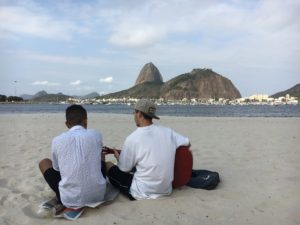The Pan American Games in 2007. The FIFA World Cup in 2014. Now the Rio 2016 Olympic Games. For the residents of Rio, the Olympic Games are the most recent in a long chain of international events taking over their home.
In recent years Rio has been transformed to prepare for all the international attention; from lodging, to roadways, to Olympic venues, the city has been in a state of transformation for at least nine years. So how do residents feel about this change?
Joâo Marcelo Pereira Daltro, a carioca (native-born resident of Rio) explained how the constant construction has affected his business. “I have some employees that are taking three hours to get [to work], when it would only take an hour and a half before,” he said. Daltro runs a hostel in Botafogo, a residential neighborhood in Rio.
From his perspective, the Olympic Games have had both a positive and negative effect on city growth. “A lot of money went to the constructors and politicians instead of other areas where it was needed,” Daltro said. Infrastructure in the form of new metro options, athletic stadiums, and apartment buildings is the tangible legacy to be left behind by the games.
 Education is also an important issue for Rio residents. Andre Luis Amaral de Oliveria, another carioca, explained through an interpreter that “education is important because it allows the younger generation to learn what has been done well in the past and what needs to be changed to help make our country the best it can be.” For Rio residents, a focused investment on the improvement of public education is a top priority, but they believe that it is glossed over by the government. Study conducted by Rio-based tourism researchers Gabriela De Laurentis, Paola Lohmann, and Kaarina Virkki of University Unigranrio indicates that plans exist to create new schools that rely on material repurposed from an Olympic stadium in the Barra zone.
Education is also an important issue for Rio residents. Andre Luis Amaral de Oliveria, another carioca, explained through an interpreter that “education is important because it allows the younger generation to learn what has been done well in the past and what needs to be changed to help make our country the best it can be.” For Rio residents, a focused investment on the improvement of public education is a top priority, but they believe that it is glossed over by the government. Study conducted by Rio-based tourism researchers Gabriela De Laurentis, Paola Lohmann, and Kaarina Virkki of University Unigranrio indicates that plans exist to create new schools that rely on material repurposed from an Olympic stadium in the Barra zone.
Regular protests during the Olympic Games indicate that tension over the deployment of resources clearly exists between government officials and Rio residents. The real legacy will become clear later, after tourists have left and the cariocas have reclaimed their city.
Marina Scherer, a journalism student at Mackenzie Presbyterian University in São Paulo, served as field producer and Portuguese translator on this story.
Photo above: Native-born residents of Rio de Janeiro, called cariocas, perform music on Flamengo beach.


I’m So proud of you girls